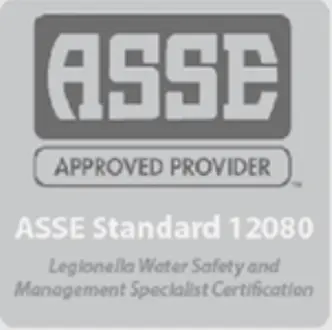Total Coliform and E. coli testing is not just a regulatory checkbox; it serves as a frontline defense against public health hazards.
For industries and commercial facilities that supply, manage, or discharge water, the presence of microbial contaminants introduces serious compliance liabilities and reputational risks.
These tests are mandated by federal and state agencies, including the EPA, NYSDOH, and NJDEP, for good reason: coliform bacteria signal a potential pathway for pathogens to enter the water system, while E. coli confirms the presence of fecal contamination.
Why Industries Must Take Microbial Testing Seriously
E. coli and Total Coliform bacteria are used as indicators of microbiological water quality. Their detection is a warning sign of compromised systems, such as contaminated source water, cross-connections, leaky infrastructure, or ineffective disinfection.
In industrial or commercial settings (e.g., manufacturing plants, food processing facilities, schools, campgrounds, bottled water companies, or any operation with a private water supply), routine testing is required to:
- Ensure employee and customer health
- Protect the integrity of product lines that use water
- Comply with drinking water regulations for non-community and transient systems
- Satisfy building code and occupancy permit requirements
PITS Environmental
From air quality to hazardous materials, our certified testing keeps you compliant and safe.
Testing Frequencies and Compliance Requirements
Under the Revised Total Coliform Rule (RTCR), the frequency of required testing varies based on the type and size of the water system:
- Community Water Systems (CWS): The number of required monthly samples is based on the population served. For example, systems serving 25 to 1,000 people must collect at least one sample per month, while larger systems have higher sampling requirements.
- Non-Community Water Systems (NCWS): Systems using only groundwater and serving 1,000 or fewer people must monitor at least quarterly. However, states may reduce this frequency to annually if certain sanitary conditions are met.
- Private Wells: While not regulated under the RTCR, the New York State Department of Health recommends annual testing for Total Coliform and E. coli.
- Seasonal Systems: Must conduct a state-approved startup procedure, including testing, before serving water to the public each season.
If a routine sample tests positive for Total Coliform, the system must collect a set of repeat samples within 24 hours. If E. coli is detected, it constitutes an acute Maximum Contaminant Level (MCL) violation, necessitating immediate public notification and corrective actions.
Ensure your property meets all safety standards with our comprehensive testing services
What Are the Risks of Non-Compliance?
Failing to monitor and address E. coli or Total Coliform contamination can lead to:
- Federal and State Fines: Under the Safe Drinking Water Act, violations can result in fines of up to $25,000 per day, per violation. Repeat violations trigger steeper penalties.
- Shutdown Orders: Health departments can issue immediate boil-water notices, shut down facilities, or restrict use of water sources until clear samples are provided.
- Permit Suspensions or Delays: Incomplete or failed testing can delay permits for expansion, facility operation, or water use authorizations.
- Legal and Civil Liability: If employees, customers, or the public become sick due to contaminated water, the business may be subject to lawsuits and health claims.
- Damage to Reputation: Water safety incidents can severely damage brand credibility and client trust, especially in food, beverage, and healthcare industries.
Why These Tests Are Always on the Compliance List
Federal and state regulations mandate microbial testing because:
- Coliforms are reliable indicators of waterborne pathogen intrusion.
- E. coli confirms fecal contamination, making it a top-priority health risk.
- Quick proliferation in plumbing systems means rapid risk escalation if left unchecked.
- Total Coliform Rule (TCR) and Revised TCR require regular monitoring and response protocols, including trigger-level action.
Examples of required testing include:
- Non-transient non-community systems (e.g., office buildings, industrial parks)
- Facilities with private wells supplying employees or clients
- Post-flood or plumbing infrastructure repair situations
- Schools, child care centers, and healthcare facilities
Worried About Hidden Toxins?
Protect Your Property and Health. Schedule a Certified Environmental Inspection Today.
Industry-Specific Implications
Food/Beverage Production: Water used for rinsing, mixing, or ingredient inclusion must be bacteria-free to avoid contamination of products.
Manufacturing with Cooling Towers or Boilers: Bacterial contamination can damage systems, reduce efficiency, and present inhalation risks. Systems like cooling towers are also subject to legionella risk assessment to prevent aerosolized health hazards in addition to bacterial contamination.
Hospitality (Hotels, Campgrounds): Potable water must be compliant for guests and staff to avoid closures or negative health department ratings.
Why Partner with PITS Environmental
NELAP-accredited testing aligned with EPA and state requirements
Fast turnaround and emergency sampling available
Detailed reports for regulatory submissions
Onsite guidance to help you prevent future contamination events
We also offer compliance testing across multiple environments to help businesses maintain operational integrity and meet inspection requirements.
Final Thoughts
Ignoring or underestimating the importance of E. coli and Total Coliform testing is not only non-compliant, it’s dangerous. These microbial indicators help detect issues early and prevent health crises. Testing is required because the risks of contamination are too great to leave unchecked.
If your business owns or operates a water system, contact PITS Environmental today to schedule your microbial testing and ensure your water is safe, compliant, and trusted.
Learn more about how we help protect drinking water safety in industrial and commercial settings.


